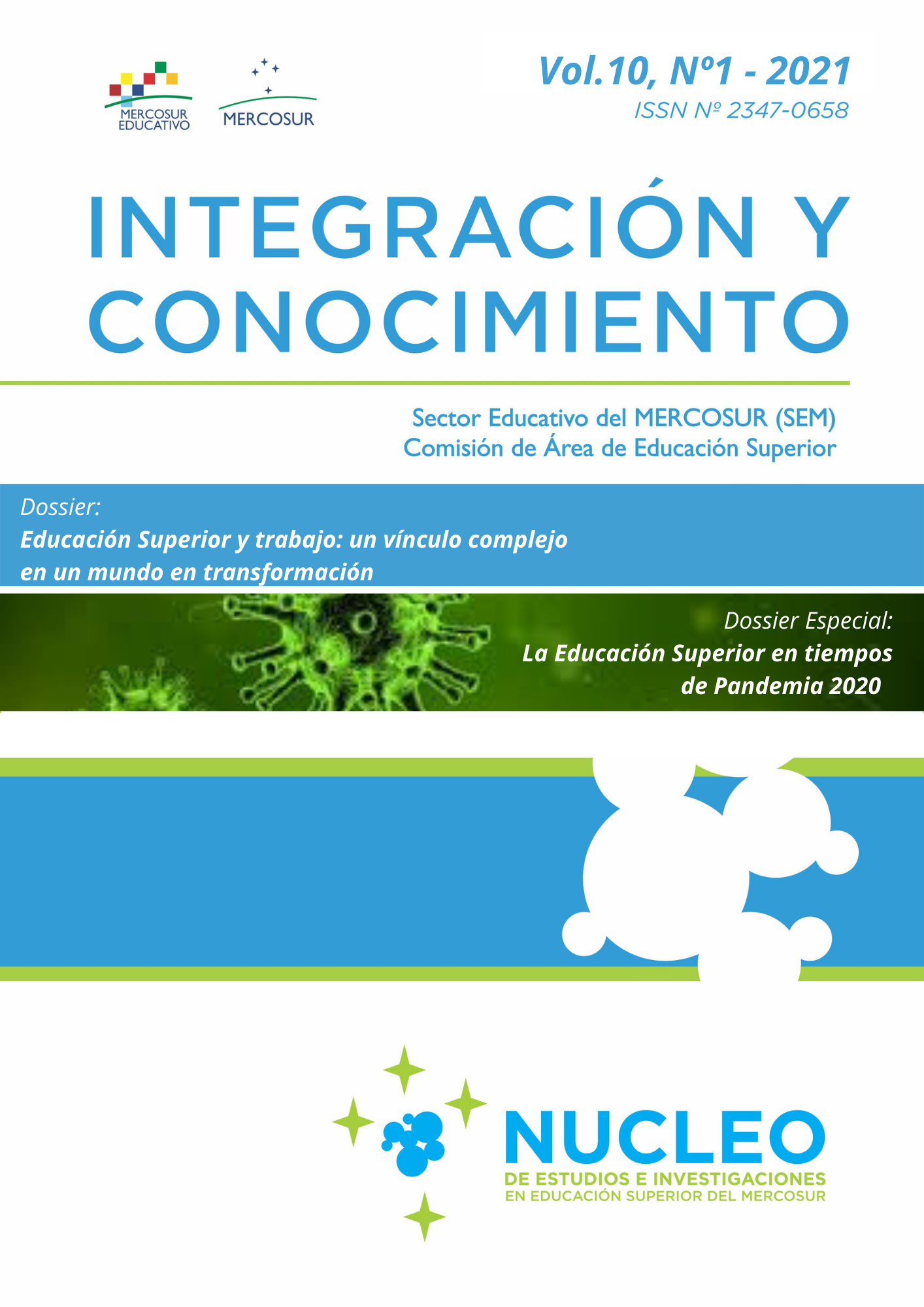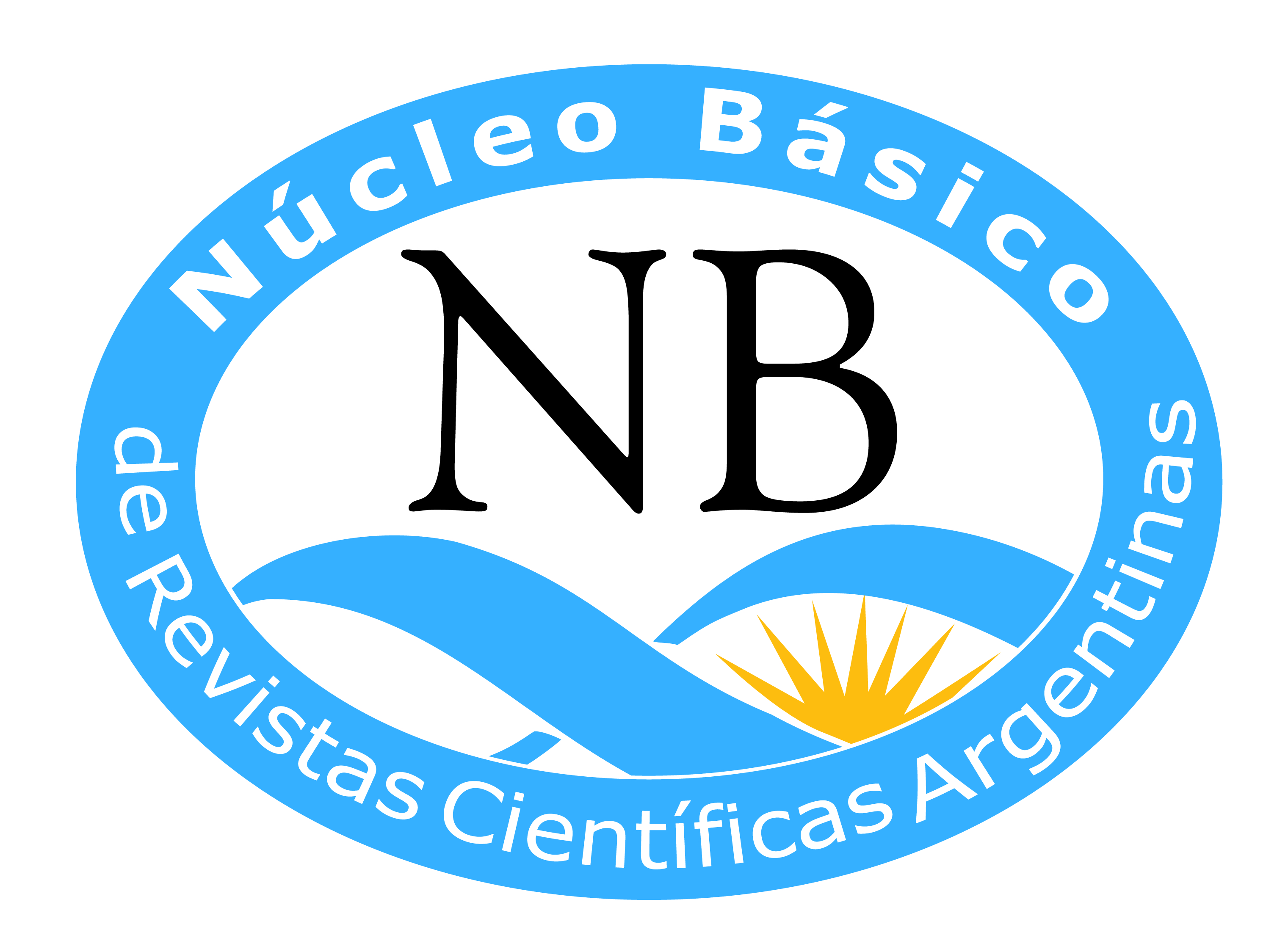PROFESSIONAL MERCOSUR: FROM THE STATE TO THE MARKET?
DOI:
https://doi.org/10.61203/2347-0658.v10.n1.31944Keywords:
MERCOSUR; Profesionales; EstadoAbstract
The purpose of this article is to analyze the contrast between the professional MERCOSUR project with the different obstacles and risks that political changes in the differents members states of the bloc imply for this sector. The complexity of the integration of the regional professional space is subject to and permeated by the various political swings that, added to the unilateral nature of the public policies of the various member states, far from encouraging integration, can cause irreversible damage in the professional spaces of other countries in the block. The strongly presidential nature of the MERCOSUR States, reinforced by the great existing economic and territorial asymmetries, tend to reinforce poorly articulated integration logics that tend to present strong risks for the inequalities existing in many of these countries. Based on the analysis of primary and secondary sources, such as in-depth interviews with officials, former officials, diplomats and representatives of professional organizations, and documentary sources, based on the Argentine case, we seek to account for the complexity and tensions that the convergence of professional spaces in MERCOSUR.
Downloads
References
Abbott A. (1988). The System of Professions. An Essay on the division of expert labor. Chicago and London, United Kingdom: The University of Chicago Press.
Balassa, B. (1961). The theory of economic integration. London, United Kingdom: G. Allen and Unwin.
Bartolini, S. (1999). Tiempo e Investigación Comparativa. En G. Sartori & L. Morlino (Comp.), La Comparación en las Ciencias Sociales.Madrid, España: Alianza Editorial, pp. 105-150.
Bezès, P. (2000). Les hauts fonctionnaires croient-ils à leurs mythes? L’apport des approches cognitives à l’analyse des engagements dans les politiques de réforme de l’État. Quelques exemples français (1988-1997). Revue française de science politique, 50 (2), 307-332.
Botto, M. I. (2011). ¿Qué nos enseñan los 20 años del Mercosur? .Nueva Sociedad (232), 17-25.
Bouzas, R. (2001). El MERCOSUR diez años después ¿Proceso de aprendizaje o déjàvu? Desarrollo Económico, 41 (162), 179-200.
Ciccolella, P.; Fernandez Caso, M. V.; Laurelli, E. & Rofman, A. (1993). Modelos de integración en América Latina. Desafíos y alternativas en la construcción de un nuevo territorio latino-americano. Buenos Aires, Argentina: CEAL.
CPAU (2004). El Ejercicio profesional en la globalización, acreditación de carreras. Buenos Aires, Argentina.
Dabène, O. (2009). The politics of regional integration in Latin America: theoretical and comparative explorations. New York, United States: Palgrave Macmillan.
De Sierra, G. (Comp.), (2001). Los Rostros del MERCOSUR. El difícil camino de lo comercial a lo societal. Buenos Aires, Argentina: CLACSO y ASDI.
Didou Aupetit, S. & Gérard, E. (Eds.). (2009). Fuga de cerebros, movilidad académica, redes científicas Perspectivas latinoamericanas. México D.F., México: IESALC – CINVESTAV – IRD.
Dingwall, R. (2008). Essays on professions. Aldershot - Burlington, United Kingdom: Ashgate.
Dolowitz, D. P. & Marsh, D. (1996). Who Learns What from Whom: a Review of the Policy Transfer Literature. Political Studies 44, 343-357.
Dolowitz, D. P. & Marsh, D. (2000). Learning from Abroad: The Role of Policy Transfer in Contemporary Policy-Making. Governance, 13 (1), 5-24.
Drake, W. J. & Nicolaïdis, K. (1992). Ideas, interests, and institutionalization: “trade in services” and the Uruguay Round. International Organization, 46, 37-100.
Dubar, C. (2008). Temporalité, temporalités: philosophie et sciences sociales. Temporalités, (8). Recuperado de http://temporalites.revues.org/137
Dubar, C. (2014). Du temps aux temporalités: pour une conceptualisation multidisciplinaire. Temporalités, (20). Recuperado de http://temporalites.revues.org/2942
Dubar, C. & Tripier, P. (1998). Sociologie des professions. Paris, Francia:Armand Colin.
Durkheim, É. (2010). De la Division Du Travail Social: Etude Sur L'Organisation Des Societes Superieures (1893). Whitefish: Kessinger Pub Co.
Edelman, M. (1991). La construcción del espectáculo político. Buenos Aires, Argentina: Manantial.
Evans, M. & Davies, J. (1999). Interpretación de la transferencia de políticas: una perspectiva multidisciplinaria y de niveles múltiples. Gestión y Política Pública, 2 (VIII), 201-246.
Fawcett, L. & Hurell, A. (Eds.) (1995). Regionalism in world politics: regional organization and international order. Oxford, United Kingdom: Oxford University Press.
Freidson, E. (1988). Professional powers: A study of the institutionalization of formal knowledge. Chicago, United States: University of Chicago Press.
Kingdon, J. W. (1995). Agendas, alternatives and public policies. United States: The University of Michigan, Longman.
Haas, E. B. (1958). The Uniting of Europe. Political, social, and economic forces 1950-1957. Stanford, California, United States: Stanford University Press.
Haas, P. M. (1992). Introduction: epistemic communities and international policy coordination .International Organization, 46 (1), 1-35.
Holzinger, K. & Knill, C. (2005). Causes and conditions of cross-national policy convergence. Journal of European Public Policy, 12 (5), 775-796.
Hughes, E. C. (1997). Le regard sociologique: essais choisis. Paris, Francia: Ecole des hautes études en sciences sociales.
Lagroye J., François, B. & Sawicki, F. (2002). Sociologie politique. 4e édition revue et mise à jour, Paris, Francia: Presses de sciences po et Dalloz.
Lasswell, H. D. (1956). The decision process: Seven categories of functional analysis.United States: University of Maryland. Bureau of Governmental Research.
Lowit, J. (1972). Four Systems of Policy, Politics, and Choice. Public Administration Review, 32 (4), 298-310
Malamud, A. (2001). Democracias presidencialistas y procesos de integración. Hacia un enfoque comparativo del MERCOSUR”. En J. Pinto (Comp.), Argentina entre dos siglos. La política que viene (pp. 277-314). Buenos Aires, Argentina: EUDEBA.
Mèny, Y. & Thoenig, J.-C. (1989). Politiques publiques. Paris, Francia: PUF.
Molano-Cruz, G. (2017). La construcción de un mundo de regiones”. Revista de Estudios Sociales 61, 14-27 https://dx.doi.org/10.7440/res61.2017.02
Muller, P. & Surel, Y. (1998). L´Analyse des politiques publiques. Paris, Francia: E. Montchrestien, Clefs/Politique.
Oteiza, E.; Novick, S. & Aruj, R.(1997). Inmigración y discriminación. Políticas y discursos. Buenos Aires, Argentina: Grupo Editor Universitario.
Palacio, S. B. & De Paula, J. C. G. (1998). La Abogacía organizada en el proceso de integración del MERCOSUR. Argentina: Colegio de Abogados de San Isidro. Recuperado de http://www.coademnet.org/index.php
Panaia, M. (2006). Trayectorias de ingenieros tecnológicos. Graduados y alumnos en el mercado de trabajo. Buenos Aires, Argentina: UTN Facultad Regional General Pacheco, Miño y Dávila.
Peters, B. G. (1995). Modelos alternativos del proceso de la política pública: de abajo hacia arriba o de arriba hacia abajo. Gestión y Política Pública, 2 (IV), 257-276.
Robertson, S. L.; Bonal, X. & Dale, R. (2002). GATS and the Education Service Industry: The Politics of Scale and Global Reterritorialization. Comparative Education Review, 46 (4), 472-495.
Saglio, J. & Thuderoz, C. (1989). Entre monopole et marché : les professions règlementées face à l’Europe. Lyon, Francia : Groupe lyonnais de sociologie industrielle Collection.
Solanas, F. (2007). El MERCOSUR y las políticas públicas de reconocimiento de títulos universitarios: el caso argentino. Tesis de doctorado de la Universidad de Buenos Aires en Ciencias Sociales, Buenos Aires.
Solanas, F. (2016). MERCOSUR - Union européenne : une comparaison des politiques publiques de reconnaissance académique professionnelle dans les cadres de l’Argentine et de la France, Thèse de doctorat en Science politique. Sorbonne Paris Cité. Recuperado de http://www.theses.fr/2016USPCA047
Vazquez, M. (2017). El MERCOSUR. De Asunción a Asunción. Trabajo presentado en el 9º Congreso Latinoamericano de Ciencia Política, organizado por la Asociación Latinoamericana de Ciencia Política. Montevideo, Uruguay.
Weber, M. (1944). Economía y sociedad. México: Fondo de Cultura Económica.
Downloads
Published
Issue
Section
License

This work is licensed under a Creative Commons Attribution-NonCommercial-ShareAlike 4.0 International License.
Authors who have publications with this journal accept the following terms:
a. Authors shall retain their copyright and guarantee the journal the right of first publication of their work, which shall simultaneously be subject to the Creative Commons License of Recognition which allows third parties to share the work as long as its author is indicated and its first publication is this journal.
b. Authors may adopt other non-exclusive licensing agreements for the distribution of the published version of the work (e.g., depositing it in an institutional telematic archive or publishing it in a monographic volume) provided that the initial publication in this journal is indicated.
c. Authors are allowed and encouraged to disseminate their work via the Internet (e.g. in institutional telematic archives or on their website) after publication of the article, which may lead to interesting exchanges and increased citations of the published work. (See The Effect of Open Access).



